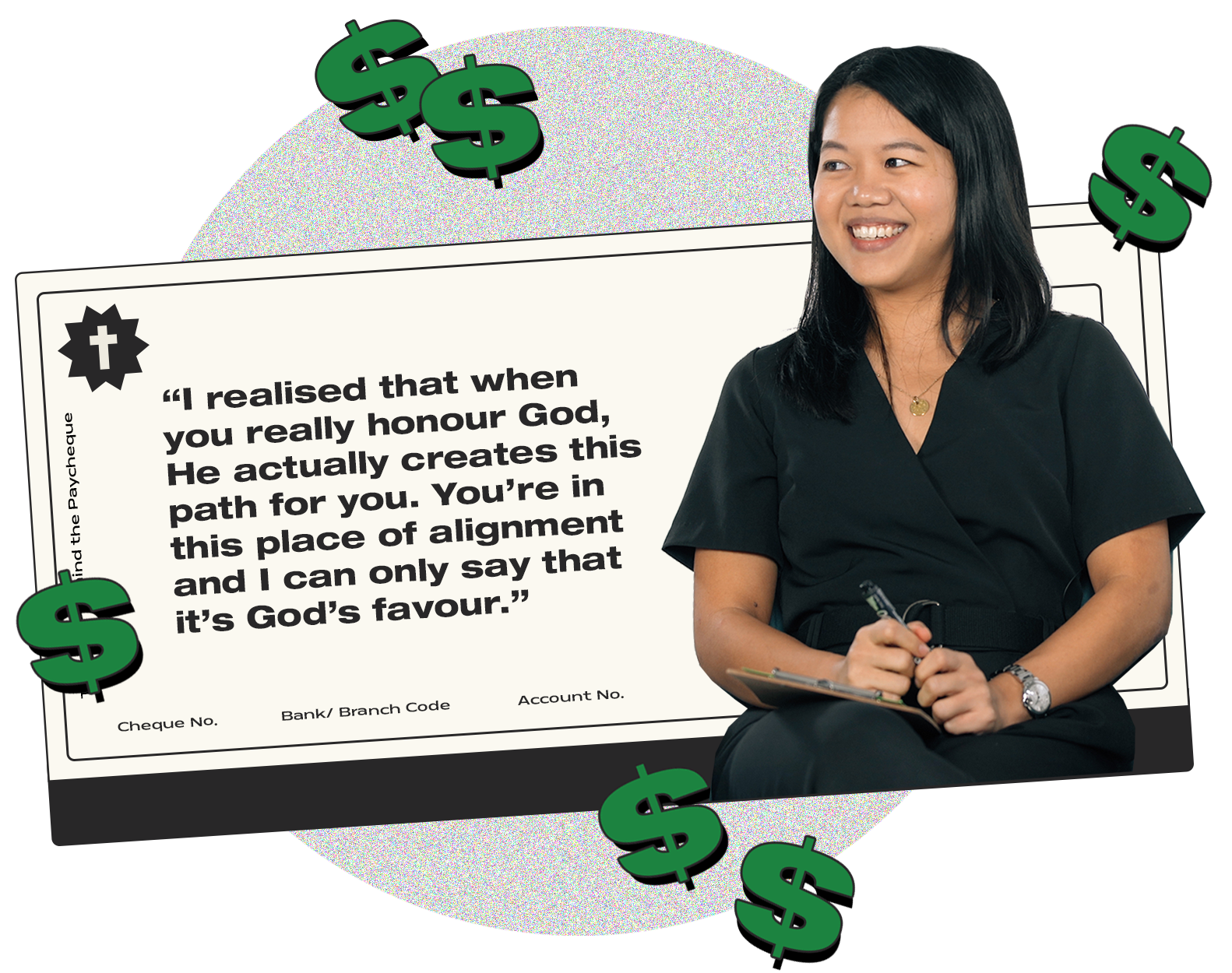Do money and faith go together? What about those who make a living from generating more wealth for others?
In our brand new series, #BehindThePaycheque, we hear from professionals across different industries on why they do what they do as they answer burning questions crowdsourced from our readers.
Today, we have two financial professionals – a financial advisor and a hedge fund manager – to share with us their thoughts and experiences.
 Juggling church commitments and long working hours
Juggling church commitments and long working hours
One of the challenges that a financial professional (or any working adult, really) faces is the long working hours.
Claudia Tan (31), who is a financial advisor, empathises especially because her work is commission-based.
Less time at work? Less money.
“In my line of work, there’s no such thing as rest time,” she said with a laugh. “Whenever time is taken away, it’s only natural to think: Oh no, it’s time away from work, and I cannot put in the effort to get the output.
“But I realised that when you really honour God, He actually creates this path for you. You’re in this place of alignment, and I can only say that it’s God’s favour.”
One thing Claudia does is to inform her clients that she doesn’t work on Sundays so that she can prioritise serving in church.
“My clients actually respect that, and I use it as an opportunity to share my faith too,” she said.

Raphael Foo agreed with Claudia’s sentiments.
Reflecting on his own experiences, the 32-year-old hedge fund manager said: “I found it to be true that if I carve out time to serve the Lord, God would create more time for me.
“This is one thing that I’ve learnt in my own life.”
Accumulating wealth
Accumulating wealth carries the connotation of one being greedy and obsessed with money.
But it turns out, there is a difference between accumulating wealth and accumulating wealth as a primary goal in life.
Raphael elaborated: “I want to do well in my job. I want to accumulate more wealth. But at the end of the day, it’s not just for my own usage.
“The primary goal of why you want to do what you want to do is because you have the Lord Jesus Christ as the centre of your motivation.”
This attitude also applies in his profession of growing clients’ investment portfolios as well.
“Even though the money belongs to other people, to our clients and to governments around the world, at the end of the day, I think of it as the Lord’s money,” revealed Raphael.
“And I have to take care of it as if the Lord gave it to me and personally asked me to look after it.”
Concurring with Raphael’s views on stewardship, Claudia believes wealth can be used for God’s purposes: “My church actually started in the attic because a Christian family let us use their attic every Sunday.
“That was their way of giving back, using their wealth for good.”
To Claudia, the reason why we accumulate wealth and the way we use our resources are important factors to consider.
Raphael also cautioned, however, that solely pursuing wealth can lead to the idolatry of money: “You can give into greed and you can give into this false belief that money gives you a lot of security in this world.”
Purpose in the workplace
Taking on a more personal question, Claudia shared how she chose to be a financial advisor.
“I went through this quarter-life crisis at 20 years old, and I felt strongly about going into missions,” the 31-year-old recounted.
However, her dad encouraged her to further her studies and equip herself so that she would be in a better position to help others.
That made dollars and sense to Claudia, so she went on to study finance at university.

In the process, she found out that the corporate industry was not suitable for her.
“I did a SWOT analysis on myself based on my personality. And I felt very strongly about investing in individuals. That’s when I became an insurance agent.”
Claudia continued: “I have met people who live paycheque to paycheque, and I have met people who have millions but are going through divorces, bankruptcy and have no hope.”
In times like these, she’s able to give practical help using the skillsets that she has. Sometimes there will be opportunities for her to pray for her clients too, she added.
Beyond the short-term goal of investing in individuals, Claudia also hopes to channel her wealth into funding missions in the long run.
What’s the difference between investing and gambling?
To wrap the discussion up, Claudia and Raphael tackled the age-old question: Where’s the line between investing and gambling?
Both financial professionals agreed that the core difference lies in “research and methodologies”.
“Gambling is like… You close your eyes and throw your money,” Claudia joked. “But investing, there are different principles.”
“There are people who trade, who do long-term investments, and we look at the time, horizon and risk profiles. So there’s a framework in investment planning.”
Raphael agreed: “Gambling is when you put your trust in luck because you have no certainty of outcome. But investing involves having done some work to determine what I think will be the outcome.”
However, he also pointed out that investment can sometimes be a form of gambling too: “Very often, unbeknown to them, investment becomes a form of gambling because people are just doing it without knowing what’s going to happen.
“They are doing it just because they hope or they heard something. And that can be quite dangerous. And oftentimes it’s driven by greed — that would be the difference.”
“For the love of money is a root of all kinds of evil.” (1 Timothy 6:10a)
Having heard Raphael and Claudia share, I’ve come to see that money isn’t inherently good or evil – it’s what we do with it that counts.
Whether we’re in the finance industry or not, we can always learn to steward our resources.
Let’s be that good and faithful servant that God has called us to be.








